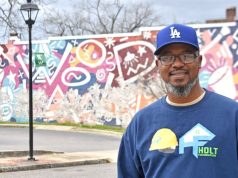By Nicole S. Daniel
The Birmingham Times
With young people facing more challenges today with mental health, social media and psychosocial changes, the Adolescent Health Center at Children’s of Alabama finds itself providing more services than ever.
The center specializes in primary care and welfare for individuals ages 11 to 21 using a multidisciplinary approach and subspecialty care for adolescents who have unique developmental needs and are exposed to different situations than younger children, said Tamera Coyne-Beasley, M.D., Director of the UAB Division of Adolescent Medicine at Children’s of Alabama.
Consultations at the health center are important not only for the parents but for doctors in surrounding facilities should they need to utilize the services or refer their patients to the Adolescent Health Center.
Some of the services handled by the center include comprehensive health assessments, immunizations, acute illnesses and minor trauma, acne management, menstrual disorders, sports physicals and even complex conditions that haven’t even been defined, said Beasley, who is also UAB Professor of Pediatrics and Internal Medicine, and UAB Vice Chair for Community Engagement.
“We also screen and assess all of our adolescents for any mental health issues. And when they are doing well, we actually support their wellness and their resiliency,” said the doctor.
Adolescents requires specialization because of a unique developmental stage that they’re going through, Beasley said.
“Just the way that their bodies are different than younger kids, not only are there hormonal changes, there are also psychosocial changes that impact our young people. So when I think about our specialty services, and these are services that not only parents can come to refer their kids to, but also we’d love for doctors in the surrounding area to be aware of, so if they have any of these issues with their parents, with their families, they can send them to us,” she said.
Asked some of the things medical professionals are finding with young people, Beasley said, “We’re seeing a lot of eating disorders and eating disorders, is not just a medical condition, it’s a psychological condition as well. And we’ve seen that surge throughout the country.”
Within the Adolescent Clinic there is a also a Female Adolescent Bleeding Clinic (FAB), she said. “We collaborate with Pediatric Hematology Physicians. That’s actually a really important national distinction that we have,” said Beasley.
“People can have bleeding disorders for a variety of reason. Sometimes it can just be hormonal and related to their menstrual cycle but, people have bleeding disorders like Von Williebrand Disease, a lifelong bleeding disorder in which your blood doesn’t clot properly and often times some of the ways that its diagnosed is because appears to be menstrual bleeding,” said Beasley.
Not only does the clinic have medical doctors, but all are also trained in adolescent medicine and pediatrics. The clinic also has registered dieticians, psychologists, and social workers. “And so that’s what allows us to be able to provide these comprehensive wraparound services for adolescents. And because we’re also a primary care clinic, we can actually follow them throughout their entire adolescence into adulthood, said Beasley.

Mental Health
At Adolescent Health Center every patient is screened routinely for mental health disorders and depression.
“It’s important for people to understand within adolescent health is that mental health is a part of health care,” said Beasley. “So many places don’t have the resources and they provide direct care for adolescents in their own clinics. We have integrated mental health care so when you come to our clinic, you have the opportunity to see, not just me, but you can also see a psychologist and a social worker at the same during the same visit. So our visits tend to be a little bit longer, but they’re actually more comprehensive. You would be surprised how many parents don’t even recognize that their children are suffering.”
Screening for routine annual visits for depression is important because about 20 to 25 percent of young people will have a mental health condition, she said. “We also know that mental health conditions actually develop in adolescence, and we know that we can treat depression there.”
Beasley said suicide and homicide continue to be the leading causes of death for young people. “And there have been lots of stresses that are new and different that young people are starting to experience, like the impact of social media on their lives,” she said. “And while yes, it can be positive in many ways, it can also be a source of misinformation, it can also promote poor self-esteem. It creates anxiety when you see other people who have what appears to be a better life than yours.”
The doctor pointed out that adolescence is a period where young people are experimenting developing their moral, physical and social selves. “You will make mistakes, you will do things that might be embarrassing, but in the old days, you would do those things, and no one would ever know about it, because it wasn’t captured on film, or on a video and played over and over again. That’s clearly one of the things that stresses young people, the stress of keeping up with social media about being liked, and loved and having a certain number of friends.”
For more information or to schedule an appointment call 205-638-9100 or visit https://www.childrensal.org/
Updated at 5:15 p.m. on 9/2/2022 to edit sentence and add a link.





